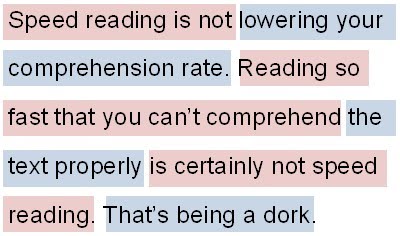The age that children usually learn to read is between 5 and 7 years old, but that’s only when they’re getting started. Individuals’s reading levels will evolve andimprove over time, developing a larger vocabulary and a deeper understanding of language over the years.
 On average, an adult usually reads just over 200 words per minute, compared to a college student who on average reads about 325 words per minute. You see, reading is something you can work and improve on, which may be the key to success for students who are under the pressure of examsand need to make the most of their time.
On average, an adult usually reads just over 200 words per minute, compared to a college student who on average reads about 325 words per minute. You see, reading is something you can work and improve on, which may be the key to success for students who are under the pressure of examsand need to make the most of their time.Speed Reading: 4 Key Areas
Accomplishing a faster way to read isn’t simply about getting through more material faster, it’s about comprehending information quicker and better than before. If you want to learn more efficiently by speed reading, the four areas outlined below will help you get to there.
#1 Concentration
“People think focus means saying yes to the thing you’ve got to focus on. But that’s not what it means at all. It means saying no to the hundred other good ideas that there are. You have to pick carefully. I’m actually as proud of the things we haven’t done as the things I have done. Innovation is saying no to 1,000 things. ” – Steve Jobs
What is Jobs getting at? Well, basically he is saying that concentration is the key to speed reading, which means saying NO to your phone, Facebook, Twitter or any kind of multi-tasking. Reading has to be your only focus.
#2 Speed
Some tricks to help you read faster:
 Focus on speed first, your level of understanding will improve with practice
Focus on speed first, your level of understanding will improve with practice- Use a guide (a finger, a pen, etc.) to avoid losing your spot
- Increase your field of vision
- Reduce eye movement
- Don’t read out loud to yourself, remember your brain is faster than your tongue
“When we read, 80% of the time is spent moving our eyes from word to word” –
#3 Understanding
Different types of reading material require different levels of comprehension. For example, it’s not the same thing to read a Harry Potter book as it is to read your chemistry textbook. Therefore, before you begin to read, you should assess what kind of text you’re facing and what your end goal is.
#4 Memorisation
We forget 50% of what we learn in about an hour unless we practice it or go over it regularly. So remember, repetition is the foundation of learning but the question is how to accomplish this repetition. For this there are several methods:
- Taking Notes is one of the most common and effective forms of repetition
- Teaching someone else will show whether you understand what you’ve read
- Mind Maps help you put everything in perspective so you can create new connections and ideas
- Using mnemonics is a great trick for better retaining information

No comments :
Post a Comment